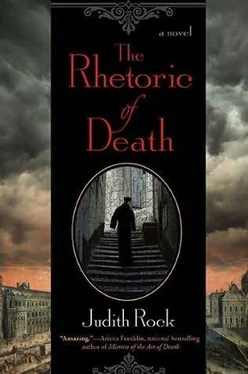Judith Rock - The Rhetoric of Death
Здесь есть возможность читать онлайн «Judith Rock - The Rhetoric of Death» весь текст электронной книги совершенно бесплатно (целиком полную версию без сокращений). В некоторых случаях можно слушать аудио, скачать через торрент в формате fb2 и присутствует краткое содержание. Жанр: Исторический детектив, на английском языке. Описание произведения, (предисловие) а так же отзывы посетителей доступны на портале библиотеки ЛибКат.
- Название:The Rhetoric of Death
- Автор:
- Жанр:
- Год:неизвестен
- ISBN:нет данных
- Рейтинг книги:3 / 5. Голосов: 1
-
Избранное:Добавить в избранное
- Отзывы:
-
Ваша оценка:
- 60
- 1
- 2
- 3
- 4
- 5
The Rhetoric of Death: краткое содержание, описание и аннотация
Предлагаем к чтению аннотацию, описание, краткое содержание или предисловие (зависит от того, что написал сам автор книги «The Rhetoric of Death»). Если вы не нашли необходимую информацию о книге — напишите в комментариях, мы постараемся отыскать её.
The Rhetoric of Death — читать онлайн бесплатно полную книгу (весь текст) целиком
Ниже представлен текст книги, разбитый по страницам. Система сохранения места последней прочитанной страницы, позволяет с удобством читать онлайн бесплатно книгу «The Rhetoric of Death», без необходимости каждый раз заново искать на чём Вы остановились. Поставьте закладку, и сможете в любой момент перейти на страницу, на которой закончили чтение.
Интервал:
Закладка:
“I have been giving thanks that my godson is so much improved,” he said. “And praying for his brother. I was about to come to you.”
Doute held Guise’s outstretched hands as though they were a lifeline. “Sebastian, I cannot stop asking myself how all this happened. Have you any more thoughts on where Philippe could be? Lisette is hysterical.”
“Of course she is, mon ami, she loves them like her own.”
Guise gestured a curt dismissal at Charles and led Doute to a pair of high-backed chairs placed against a wall. Ignoring his conscience’s lecture on eavesdropping, Charles withdrew to the most shadowed corner of the antechamber, under the stairs.
“This worry over the boys is not at all good for Lisette,” he heard Guise say gravely. “Not in her condition.”
Doute murmured something Charles didn’t catch. Then Guise’s voice rose.
“No, no, Fernand, never think so, of course it was only an accident! The other is nothing but an evil story and I am sorry the rector made you hear it. But-forgive me-Pere Le Picart is a peasant at heart and he takes the baker’s stupid wife at her word. Our poor Antoine simply slipped in the eternal mud of Paris, and that drunken ass rode over him. An accident and nothing more. I have the word of a good honest man as witness to that.”
Doute’s sad basso murmured interrogatively.
“Yes,” Guise said, “this man saw everything and that is what he swears. Of course no one meant to harm the child! You can make yourself easy on that point. Now. Tell me again what you have done to find Philippe, so that my efforts do not waste time by duplicating yours.”
“I don’t know what more to do, Sebastian! I have spoken or sent messages to all our family and friends here in town. No one has seen the boy. My manservant asked at livery stables round about if Philippe had hired a horse, but learned nothing.”
Both voices dropped into antiphonal murmuring until a chair creaked and Doute said clearly, “I pray that he will simply come home. If God will grant me that, and Antoine’s recovery, I swear I will never trouble Him for anything else.” He sighed like a small bellows. “Now I must go back to Lisette.”
“I will come with you. Let me get a candle to light us.”
Taking the stairs silently and two at a time, Charles climbed to the staircase landing, where his cassock made him one more black shadow in the darkness. Doute followed Guise to the salon doorway, which was directly beneath Charles, and Guise came into the antechamber, took a candle from the side table, and lit it from a sconce.
“If Philippe is at home when I get back,” Doute said, “I will have his miserable hide for causing us this worry. God knows I already have too much worry without breaking my heart over the boys. You know the old Conde is failing. And if he dies-when he dies, God save him-what am I to do? His son will not want me as secretary. And, to tell the truth, I do not want him. A strange man and his temper is foul. I tell you, too, I am at my wit’s end with Lisette-she is terrified about this birth. Adeline was never like that.” Doute sighed again and the flame of Guise’s candle wavered. “But I suppose I must make allowances. Lisette is so young-and her own mother died when she was born, I suppose I must remember that, too. The poor girl badgers me every day to go to Chartres and pray before Le Saint Prepuce for her safe delivery.” Doute let out a small bark of laughter. “Can you see me doing that?”
Charles smothered his own laughter. One of his aunts was a fervent believer in the childbed virtues of Le Saint Prepuce, Our Lord’s Holy Foreskin. Treasured since His circumcision, it was touted as the only part of Him left behind on earth. Charles had often thought that it must have been of an impressive size, since so many places claimed parts of it. A snippet displayed in a sumptuous reliquary at Chartres attracted droves of pilgrims. Mostly women, of course, but always with a sprinkling of sheepish men, according to Charles’s aunt.
Guise had turned from the table with his candle and was facing Doute, giving Charles a clear view of his disapproving expression. “There is no holier relic for childbed than Le Saint Prepuce, Fernand,” he said severely. The candle flickered in the breath of his words. “Chartres is not so far away. And is it really so much to ask, to insure the safe delivery of a son-another son?”
“Well, well, I will see about going. There is time enough, she is only in her sixth month.” He frowned anxiously. “Or is it seventh?”
“Go soon, Fernand. Children come in God’s time.”
Doute turned away and Guise watched him for a moment, a mixture of satisfaction and contempt on his face. Then he padded silently after his friend.
Charles climbed to his rooms and lit his own candle. He unlatched the window and leaned out, thinking about what he’d heard and seen. He supposed Guise had met Lisette Doute when he was at court seeing his noble penitents-“confessor to many at court,” Guise had proudly informed Charles that first day at dinner. Though why anyone would choose Guise as confessor, Charles couldn’t imagine. A breeze brought a faint stench of decay-from nothing worse than the dead cat that had claimed his new skullcap, he hoped-and he shut the window and took his meditations on mortality to the prie-dieu in the corner. Fixing his candle securely in the wall holder, he knelt and gazed at the small painting of the Virgin and Child on the wall in front of him. Then he said Compline and asked the Blessed Mother to protect Antoine, Pernelle, his uncle suffering in the galleys-if he still lived-and all prisoners, captives, and fugitives. Including the silly young idiot Philippe.
Charles stayed on his knees and tried to let the flowing, melting images that filled his mind carry him deeper, into wordless prayer. Instead, they carried him into the past. He saw himself on the June morning nine years ago, when he was still recovering from his war wound, and his father came to his chamber to tell him that Pernelle was married. He watched himself ignore his mother’s fussing and go out through the vineyards to climb at a breathless snail’s pace up a path yellow with dust. He watched himself take refuge in the cool shallow cave where he and his brother and sisters had played, where he and Pernelle had talked and kissed. He watched his nineteen-year-old heart shrivel and curl in on itself. Then he watched himself go home in the cool of the evening, as dry inside as the sunbaked path, and give all his energy to recovering, watched himself take leave of his parents a month later and go back to the army, resolved to die heroically and as soon as possible.
Even kneeling at the prie-dieu, Charles had to laugh. Instead of a heroic death, he’d gotten near fatal dysentery and been back home within the year, weak as a newborn puppy. During his long and difficult recovery, someone had loaned him a life of St. Ignatius. He’d read it and reread it, and when his strength finally returned, he’d presented himself at the Jesuit novitiate in Avignon.
He started to get up and then sank down again, remembering that he’d missed his hour of private meditation. Grimacing as his knees met the kneeling bench’s worn padding, he yawned and set himself to imagine a scene from the life of Christ and then imagine himself into it, as St. Ignatius had taught. He found himself imagining Mary’s baby as a little boy Antoine’s age, getting in the way in the carpenter shop, bothering his mother with questions, playing noisily in the street with other boys. Had Mary worried that those long-ago streets were dangerous for children? Charles yawned again and the candle flickered. The Virgin’s sad eyes seemed to sharpen their gaze. His own eyes closed, and he heard her soft voice.
Читать дальшеИнтервал:
Закладка:
Похожие книги на «The Rhetoric of Death»
Представляем Вашему вниманию похожие книги на «The Rhetoric of Death» списком для выбора. Мы отобрали схожую по названию и смыслу литературу в надежде предоставить читателям больше вариантов отыскать новые, интересные, ещё непрочитанные произведения.
Обсуждение, отзывы о книге «The Rhetoric of Death» и просто собственные мнения читателей. Оставьте ваши комментарии, напишите, что Вы думаете о произведении, его смысле или главных героях. Укажите что конкретно понравилось, а что нет, и почему Вы так считаете.












